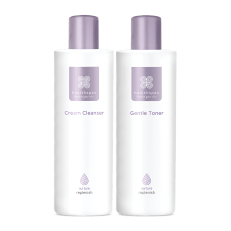If you have sensitive skin, dry skin, or redness, it could be the result of a damaged skin barrier. Beauty writer Jocelyn Bailey explains more, including why your skin barrier is so important and how to keep it healthy.
🕒 4 min read
How your skin barrier works
Your skin is your body's largest organ, responsible for regulating temperature, sensing touch, and acting as your first line of defence against the outside world, including against germs, chemicals, allergens, and irritants.
The skin barrier, also known as the stratum corneum (or 'horny layer' in Latin) is its outermost layer, and is the part you can see.
To understand how its construction works, it may help to think of its cells as like layers of bricks in a wall, all being held in place by a fatty 'cement' of lipids (made from ceramides, cholesterol and free fatty acids). The layers are constantly renewing themselves, with the top ones shedding themselves from the surface, then being replaced by fresh cells rising from underneath.
Within these cells are hygroscopic (water-loving) molecules whose job is to retain moisture and prevent water loss. These are your NMF (Natural Moisturising Factor).
When the skin barrier is healthy it works like a seal, keeping out bacteria, toxins and other irritants, whilst keeping in hydration, ensuring the surface layer of your epidermis stays soft, supple and protected.
Damaged skin barrier
However, when you experience tightness, redness, stinging, itching or burning, even when applying relatively benign products such as water, let alone cleanser or moisturiser, that barrier isn't functioning as well as it should.
This can begin a cascade effect where increased water loss contributes to even more damage to the skin barrier, which becomes correspondingly drier, rougher, more flake-prone and uncomfortable. As your skin barrier becomes less able to prevent water loss and defend itself, it also becomes harder to repair signs of ageing.
An estimated 70 per cent of people believe they have sensitive skin, but it's possible that many of these cases may be due to poor skin barrier function. If you feel the need to reapply moisturiser multiple times a day, yet your skin still feels dry and tight, your skin barrier probably isn't doing its job properly.
Replenish Cleanser & Replenish Toner Kit
Gentle cream cleanser and tonic
- Brightens skin and reduces the appearance of pores
- Nourishes and smoothes mature skin
- With sweet almond oil, phytoestrogens and vitamin E
Causes of a damaged skin barrier
The main causes of a damaged skin barrier are over-washing, over-exfoliating and overuse of active ingredients such as retinoids, drying alcohols, AHAs and other acids. Harsh soaps and detergents can also strip lipids from the skin, as can hot water temperatures.
These aren't the only causes; some people have naturally dry or sensitive skin, which is more vulnerable to skin barrier damage, and also to environmental factors such as temperature extremes. Winter can be particularly unforgiving as we switch between dry, centrally-heated rooms to cold outdoor conditions. Pollution can be another contributing factor, so it may be worth considering an air purifier inside your home.
There are also internal contributors such as poor health, insufficient sleep, and other lifestyle factors. Smoking, for example, narrows local blood vessels, restricting blood flow and oxygen supply. Overproduction of stress hormones can decrease natural lipids, disrupt structural proteins and increase moisture loss. If you know your diet is less than ideal, try to eat more oily fish for more essential fatty acids, and more antioxidant-rich fruits and vegetables to support overall skin health and help repair skin from within. Drinking more water is beneficial, too.
How to repair a damaged skin barrier
To start repairing your skin, simply avoid the ingredients, products or techniques that triggered or at least contributed to the problem. Among the most common irritants are exfoliants, retinol, fragrance and vitamin C. For very dry hands, this may include alcohol-based gels. Instead, switch to fragrance-free, alcohol-free products, especially hypoallergenic formulas or those formulated for sensitive skin.
Simplifying your overall routine is also recommended. Stick to a gentle cleanser, hydrating serum and day and/or night moisturiser, applied twice a day. This will help to give your skin time to start the renewal and repair process.
Although there's no overnight fix, you may see improvements within two to four weeks. Be aware, however, that longer-term damage can take quite a lot longer to resolve, perhaps between three and six months, depending on how disrupted your skin barrier has become. Your age is another factor here, since cell replacement cycles slow from 28 days at the age of 30, to 45-60 days in your 40s, and 90 days in your 50s.
Be patient, and as your skin barrier gradually restores itself, sensitivity and dehydration will subside. You can then start re-introducing actives, one at a time, and at less frequent intervals. It should go without saying that if any product causes symptoms to recur you should stop using it.
- Simplify your products. Cleanse twice daily using a gentle, soap-free cleanser such as the creamy nourishing Replenish Facial Wash, which contains essential fatty acids and skin-friendly vitamins to help protect the skin barrier. If you're not a fan of face wash, try the Replenish Cream Cleanser (containing coconut oil and shea butter) and Replenish Gentle Toner (with its own moisturising complex).
- Use warm, not hot water, whether you're washing your face, hands or body. Hot water dissolves too many oils - that's why we use it to degrease the dishes. The ideal temperature for your face is no more than lukewarm.
- Focus on hydration. Use a serum enriched with glycerine or hyaluronic acid to lock in moisture and relieve tightness and irritation. The Replenish Collagen Boosting Serum is surprisingly light, yet helps visibly smoothe and hydrate skin. In tests, 89% of panellists confirmed that they experienced a moisture boost.
- Follow with a rich emollient cream. Helpful ingredients include ceramides to repair the skin barrier, panthenol to support moisture retention and niacinamide, which is anti-inflammatory. Try Replenish Day Cream SPF15, which uses vitamin E and starflower oil to soften and nourish, while Replenish Night Cream contains antioxidants and plant oils to defend the skin barrier against environmental damage. In trials, more than 96% of users said they felt their skin was fully hydrated and moisturised after using it.
- Don't neglect your body. Take short showers rather than long hot soaks. Choose gentle, unscented bodywashes, especially if you're prone to itching or dryness, then blot or pat dry gently. Follow with the luxurious Replenish Body Butter, with shea butter, cocoa butter, panthenol and vitamin E to soften and nourish. For best absorption, apply while skin is still damp. Similarly, apply hand cream straight after handwashing. Replenish Hand Cream SPF15 contains panthenol and vitamin E to nourish nails as well as skin.








